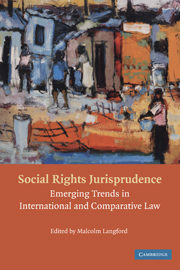Book contents
- Frontmatter
- Contents
- Foreword – Philip Alston
- Preface
- PART ONE OVERVIEW
- 1 The Justiciability of Social Rights: From Practice to Theory
- 2 The Challenges of Crafting Remedies for Violations of Socio-Economic Rights
- 3 The Right to Legal Aid in Social Rights Litigation
- PART TWO SELECT NATIONAL JURISDICTIONS
- PART THREE REGIONAL PROCEDURES AND JURISPRUDENCE
- PART FOUR INTERNATIONAL HUMAN RIGHTS PROCEDURES AND JURISPRUDENCE
- PART FIVE SPECIAL TOPICS
- Notes on Contributors
- Table of Authorities
- Index
- References
1 - The Justiciability of Social Rights: From Practice to Theory
Published online by Cambridge University Press: 05 June 2012
- Frontmatter
- Contents
- Foreword – Philip Alston
- Preface
- PART ONE OVERVIEW
- 1 The Justiciability of Social Rights: From Practice to Theory
- 2 The Challenges of Crafting Remedies for Violations of Socio-Economic Rights
- 3 The Right to Legal Aid in Social Rights Litigation
- PART TWO SELECT NATIONAL JURISDICTIONS
- PART THREE REGIONAL PROCEDURES AND JURISPRUDENCE
- PART FOUR INTERNATIONAL HUMAN RIGHTS PROCEDURES AND JURISPRUDENCE
- PART FIVE SPECIAL TOPICS
- Notes on Contributors
- Table of Authorities
- Index
- References
Summary
INTRODUCTION
In the space of two decades, social rights have emerged from the shadows and margins of human rights discourse and jurisprudence to claim an increasingly central place. In a significant number of jurisdictions, adjudicatory bodies have intervened to protect a wide range of social rights from intrusion and inaction by the State, and increasingly by non-State actors. The breadth of the decisions is vast. Courts have ordered the reconnection of water supplies, the halting of forced evictions, the provision of medical treatments, the reinstatement of social security benefits, the enrolment of poor children and minorities in schools, and the development and improvement of State programmes to address homelessness, endemic diseases and starvation. These are just a few examples of the almost two thousand judicial and quasi-judicial decisions from twenty-nine national and international jurisdictions which are described and critically analysed in this book.
What is novel is not the adjudication of social interests. Domestic legislation in many countries provides a measure of judicially enforceable labour and social rights. What is significant is that the more durable human rights dimensions of these social values or interests, whether captured in constitutions or international law, are being adjudicated. This is not to downplay the role of legislation from either a principled or pragmatic perspective. It is often more precise and contextualised and has the direct authoritative and democratic imprimatur of the legislature.
- Type
- Chapter
- Information
- Social Rights JurisprudenceEmerging Trends in International and Comparative Law, pp. 3 - 45Publisher: Cambridge University PressPrint publication year: 2009
References
- 12
- Cited by



